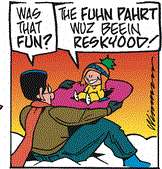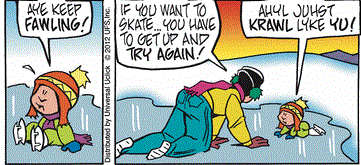Purposeless eye dialect
Eye dialect is when you write a character's dialog as he pronounces it, in an attempt to reproduce his dialect or speech patterns. It can be done to good effect, as by Mark Twain, say. It can also be a lazy way to shorthand a judgement or a characterization - say, by writing "was" as "wuz", which is how everybody says it, or the relentless apostrophe for the 'dropped g', or "coulda, shoulda, gonna, wanna". In comics, kids' speech is often done that way, to show how cutely they're mispronouncing things.
And then there's this:

Frankly, I haven't a clue what this is meant to show us. Is there anyone out there who wouldn't say "The fuhn pahrt wuz beein reskyood"? Maybe the "beein", but how else would you pronounce "fun, part, was, rescued"?
This isn't the first time they've done this, either (see below, from Jan 21). I suppose it's meant to be cute, but all it really does is make me wonder if her father says things like "wass that foon?" and "ill joost craool likuh yo."






























2 Comments:
-
At 12:05 PM, January 31, 2012
 Jan had this to say...
Jan had this to say...
-
-
At 11:30 AM, February 22, 2012
 John Cowan had this to say...
John Cowan had this to say...
-
-
<-- Older Post ^ Home Newer Post -->Yep, this drives me crazy every time; why can't they see how stupid it looks?
Everybody in the U.S. now does say was as wuz, but the evidence of Twain shows that this wasn't always true. He distinguishes clearly in dialogue between his white characters, who always say was, and his black characters, who always say wuz.
This suggests that in Twain's day, the usual American pronunciation of was rhymed with Oz[*] (which is still true in British English), and that somehow wuz became the universal pronunciation between then and now. What's more, this seems to have happened in stealth mode, since as far as I know no peevers have ever complained about it.
[*] The word Oz didn't exist then in either the Australian or the L. Frank Baumian senses, but there are very few rhymes for this pronunciation of was.
Post a Comment
Subscribe to Post Comments [Atom]